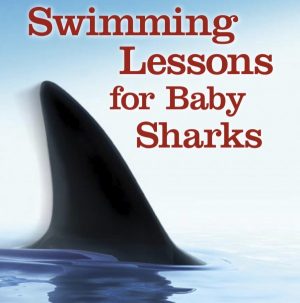Swimming Lessons For Baby Sharks: Practical Advice For New Lawyers
The start of a new year is a good time to reflect on your career and other aspects of your life for that matter.

Last month I started the column by asking a question to get your tips to help others. That worked well, so I am doing it again: Send me your thoughts on “how to take a hint.” Just send an e-mail, tweet to @babysharklaw, or post a comment here. Easy! The responses should be interesting, and I will share them in a future column.
Q: Our new billable year starts January 1. What is your advice for getting off to a good start?

Is The Future Of Law Distributed? Lessons From The Tech Adoption Curve
A: The start of a new year is a good time to reflect on your career (and other aspects of your life for that matter). Think about what you want to have accomplished at this time next year, and come up with a plan to make it happen. Here are some areas to consider:
- Projects. Think about the projects you worked on over the last 12 months. Which ones did you enjoy the most? Figure out what you can do to get more work that interests you and fewer projects that are a grind. If you enjoy your work, you will be happier – and you will do better work.
- Colleagues. In one of my surveys with Above the Law and Ms. JD, “the people I work with” was the top contributor to job satisfaction for new lawyers. Not surprisingly, “the work I do,” was a close second. And of course, the two can be related. You may enjoy projects in a particular area of practice – unless a disorganized lawyer is the one who assigns them. Reflect on the lawyers you have worked with over the past year. You don’t want to put all your eggs in one basket (in case a lawyer leaves and you can’t follow), but try to prioritize working with people that you enjoy working with. Think about your colleagues’ personalities and work styles, their interest in mentoring, and whatever else that matters to you. You may also want to seek out work from a lawyer you have not worked with before. As with everything in law, be strategic.
- In reflecting on your colleagues and projects, you should also identify the skills that you would like to learn over the next year. Prioritize skills that the firm needs and that will help you advance. If your firm has published competencies or other information about the skills it expects at particular levels, use those as a checklist. You may also want to research CLEs that you should attend.
- If you have gotten feedback about things you need to improve, make sure you have a plan to address those issues. And check in on your progress with the person who gave the feedback. In the swirl of law practice, it can be easy to revert to old habits. But the person who gave you feedback is not likely to forget.
- Your networks. Think about your internal and external networks. How many of the partners do you know at your firm? Do you know partners in other practice groups? To advance, you need to build a fan base. Consider what you can do to raise your profile and become more visible to key lawyers. You also need to identify professional connections outside the firm that you should make – and maintain – over the coming year.
- Identify specific actions to take your practice to the next level. Check on your progress as the year progresses. And set aside regular time to expand your networks and enhance your skills. By this time next year, you will have started to build a practice that works best for you.
Good luck!
Sponsored

Legal AI: 3 Steps Law Firms Should Take Now

Early Adopters Of Legal AI Gaining Competitive Edge In Marketplace

The Business Case For AI At Your Law Firm


Legal AI: 3 Steps Law Firms Should Take Now
Join the conversation by submitting questions on Twitter @Babysharklaw or here. Get the new Second Edition of Swimming Lessons for Baby Sharks here.
Grover E. Cleveland is a Seattle lawyer, speaker and author of Swimming Lessons for Baby Sharks: The Essential Guide to Thriving as a New Lawyer (West 2d. 2016). Grover specializes in programs to help new lawyers successfully transition from law school to practice, helping them provide more value and avoid common mistakes. He is a former partner at Foster Pepper PLLC, one of the Northwest’s larger firms. His clients included the Seattle Seahawks and other entities owned by Microsoft co-founder, Paul Allen. Grover is a frequent presenter on lawyer career success and generational issues at leading law firms and schools nationwide. Many questions in this column come from those programs. Readers may submit questions here or follow him on Twitter @Babysharklaw. He is not related to the 22nd and 24th President of the United States.
Sponsored

Is The Future Of Law Distributed? Lessons From The Tech Adoption Curve








